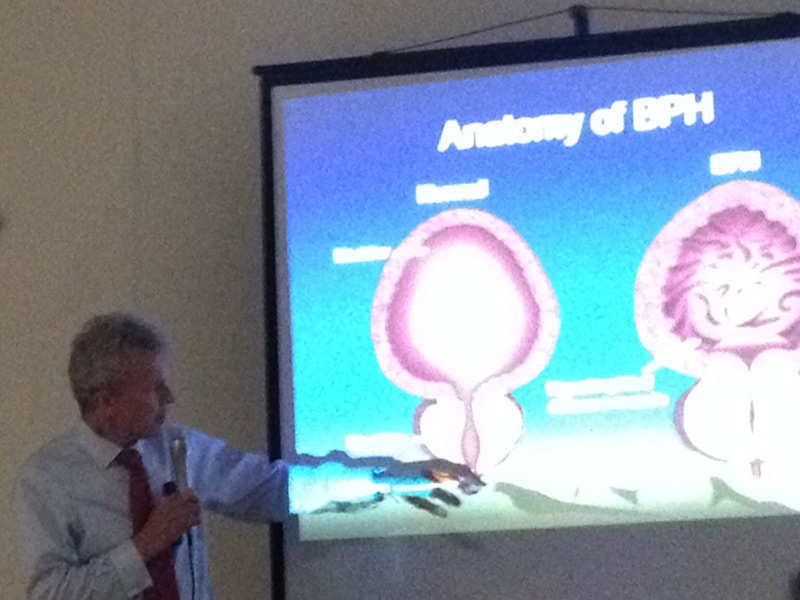The title Roger Plail gave his talk was Robots, Lasers and Iceballs. As consultant urologist at East Sussex Healthcare NHS Trust, he chose this eye-catching – and subsequently eye-watering – topic for the latest Healthy Living event organised by Ferry Road and Rye Medical Centre’s patient participation groups. With one in four men sufficiently concerned about urinary problems to consult their GP the talk attracted a large and attentive audience, with only a few looking away when the more explicit slides and videos of prostate surgery appeared.
Plail described the prostate as a ring doughnut with a narrow hole through the middle for the flow of urine. His slides showed how an enlarged prostate would obstruct the flow, necessitating a “rebore”. He also gave the audience the unusual chance to undertake a simulated “digital rectal examination”, to experience what the prostate feels like, with the aid of a small box with a replica prostate inside for us all to prod. He described in detail some of the treatments available – with the encouraging news that one in five cases of enlargement of the prostate are benign. He explained green light laser treatment with colourful analogies to machines that “beat as they sweep as they clean”, followed by a gadget like a Magimix to extract tissue for further analysis. Similarly, Plail described laparascopic procedures as being like using chopsticks – although rather more precise.
In robotic assisted surgery, also called da Vinci surgery, surgeons practise by lifting out Smarties, moving on to chicken thighs before graduating to pigs in Denmark or Germany. These robots are constantly developing, but at a cost of £1.5 million and operating costs of £100,000 pa, it was no surprise that the Conquest does not have one. The Da Vinci Si is in operation at Canterbury, Portsmouth and Southampton, but it is not conclusive that robotic-assisted surgery offers a quicker recovery rate than other types of surgery for prostate cancer.
After referring to the iceballs part of the title – cryotherapy, where a probe and liquid nitrogen are inserted, Plail went on to describe the more usual methods of prostate surgery: through a cut in the abdomen (retropubic prostatectomy); a cut between the testicles and rectum (perineal prostatectomy), at which a few more legs were crossed; and laparoscopic surgery (Eastbourne has the best equipped theatre for laparascopic surgery). He touched only briefly on radiotherapy, with hormone therapy, and brachytherapy as his time was sadly up.
Perhaps the most important message was the information on PSA (prostate specific antigen) testing, with Plail stressing how important it was that anyone with classic symptoms of urinary problems should contact their GP – and how important it was for the ladies in the audience to prod their reluctant partners into action. Survival rates for prostate cancer have been improving for more than 30 years and prostate cancer management means that an operation is not always recommended; active surveillance can be considered more appropriate.
Plail had little opportunity to tell us about the tremendous walks and bike rides he undertakes for urology charities, but he related what a huge impact “Movember” (each November moustaches are grown for a month to raise funds and awareness, particularly for Prostate Cancer UK) has made to charity funds. He himself now raises funds for The Urology Foundation (TUF) and has already helped raise £2 million. His next challenge, in November next year, is a 500km cycle ride across rural Rajasthan. Doctors, patients and supporters are invited to join him to raise funds. For more information on TUF visit the website.
Gill Clamp is on the committee of the Rye Medical Centre PPG



